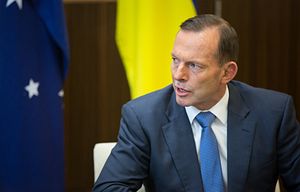Earlier this week Australia’s Prime Minister Tony Abbott outlined Australia’s new national security strategy. Much of what he said has been mooted before; however his speech, delivered Monday in Canberra at the Australian Federal Police headquarters pulled together previous points and pushed for greater policing powers and a crackdown on “hate preachers,” among other moves. Both the Martin Place attacks and the number of Australians fighting with ISIS have been driving forces. There was last year’s A$630 million ($497 million) investment in a tranche of counter-terrorist measures and the new metadata retention laws.
In September last year the national terror threat level was moved to “high.” Speaking of it Monday, Abbott said, “Critics said we were exaggerating,” and he clearly believes otherwise, pointing to terror raids, many arrests and charges, the number of Australians fighting with ISIS, and attacks such as Martin Place. “By any measure, the threat to Australia is worsening… The number of potential home grown terrorists is rising. The number of serious investigations continues to increase.” Twenty people have been arrested and charged in six months which is a third, he says, of all terrorist arrests in the past fourteen years.
One of the most notable moves is that dual citizens who travel to “banned” areas to fight or who engage in terrorism at home may lose their citizenship whilst Australian-born fighters may lose some “rights” of their citizenship, such as passports or consular assistance overseas.
Abbott has been gung-ho in his wish to fight ISIS, which he is currently calling an “Islam-ist death cult” (it can be hard to keep up with the variant appellations). The Australian recently reported that the prime minister even had hopeful ideas of an Australia-only military move against the group, which, when he floated it to commanders, was quickly nixed; it would be a terrible idea without NATO or U.S. support. Foreign Minister Julie Bishop has used her time speaking to the UN Security Council when Australia was a non-permanent member to point out the dangers of ISIS and homegrown terrorism and how to combat it. Young people can be easily got to these days, she has said.
Abbott also made much of the threats of ISIS’s “slick” social media and the ease of radicalizing people online. He asked that the metadata retention laws be passed, though they remain a source of friction and parts – such as what should be stored – largely secret. “Access to metadata is the common element to most successful counter-terrorism investigations,” he said, calling it “essential” to fighting most major crimes and also those against children.
‘Hate preachers’ will face a crackdown. “These organisations and individuals blatantly spreading discord and division such as Hizb ut-Tahrir should not do so with impunity,” said Abbott, who noted there would be stronger prohibitions on “vilifying, intimidating or inciting hatred.” Interestingly, his government had earlier tried to repeal Section 18C of the Racial Discrimination Act, which made it illegal to “offend, insult, humiliate or intimidate” a person based on their race but backed down after a popular backlash. Government members, conservative journalists and the Institute of Public Affairs (which is often called libertarian) support the repeal for reasons of freedom of speech.
“This report marks a line in the sand. There is always a trade-off between the rights of an individual and the safety of our community,” Abbott said.
Those rights come with responsibility and those who come to Australia must respect its democratic freedoms; the Martin Place gunman Man Haron Monis was given the “benefit of the doubt” too many times and Australians now feel, said the prime minister, they had been “taken for mugs.” Whilst Monis no doubt slipped through the net it was actually other Muslims who were worried about his extremist leanings. As we earlier noted, “Melbourne Shia Muslim leader Kamal Mousselmani asked the Australian Federal Police to investigate him.”
In this context Abbott’s words, “I’ve often heard Western leaders describe Islam as a religion of peace. I wish more Muslim leaders would say that more often and mean it,” sound a little hollow, especially given that during and after the siege he was at pains to distance himself from anti-Muslim rhetoric and even pointed out that the Pope is not to blame for the actions of the IRA. “The system did not adequately deal with this individual, there is no doubt about that,” he said at the time. The system will now no longer be giving people like him the benefit of the doubt. How exactly that will happen has not been made fully clear at this point.
Helen Clark was based in Hanoi for six years as a reporter and magazine editor. She has written for two dozen publications including The Diplomat (as Bridget O’Flaherty), Time, The Economist, the Asia Times Online and the Australian Associated Press.

































